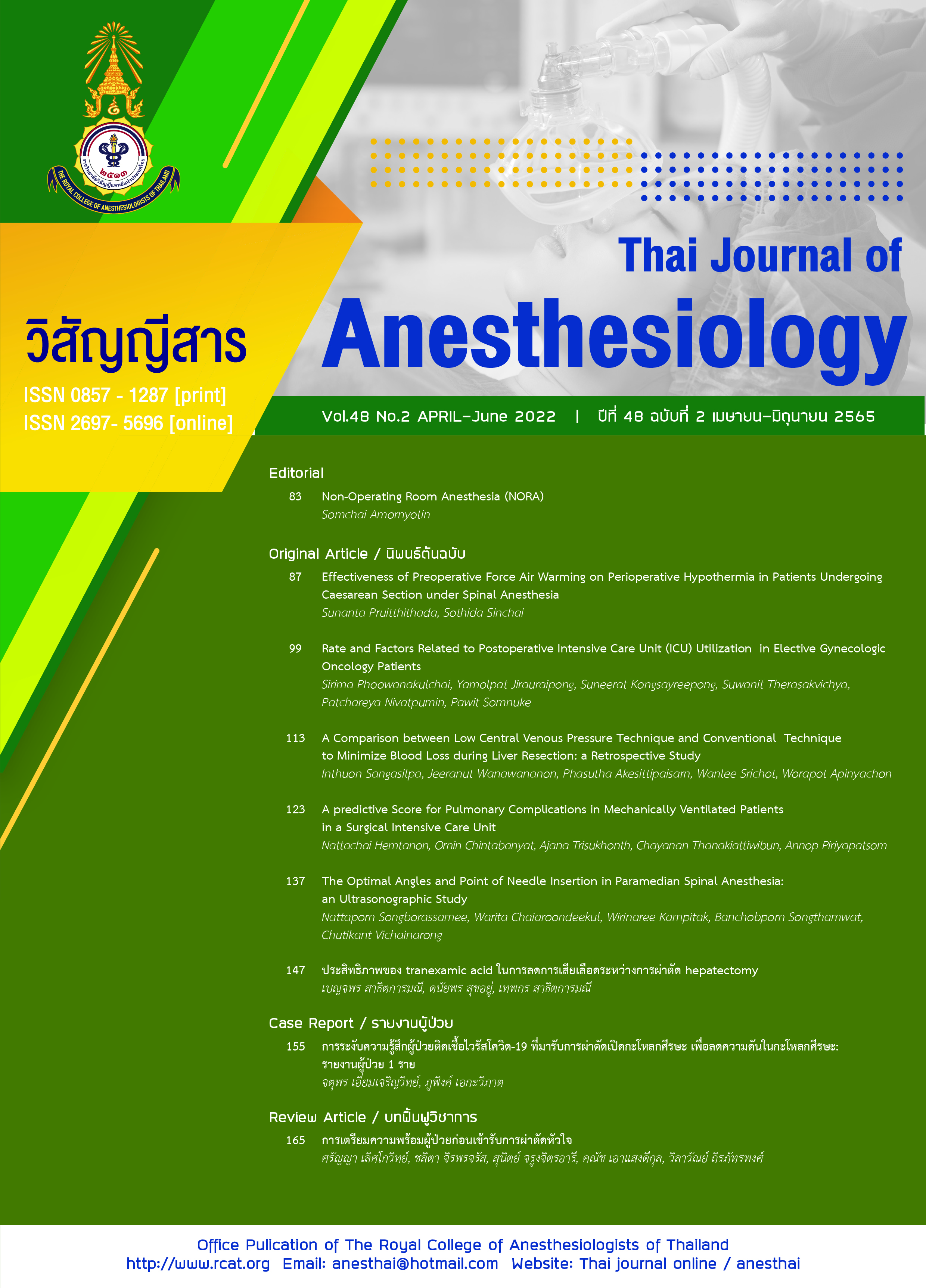Efficacy of Tranexamic Acid to Reduce Blood Loss in Hepatectomy
Main Article Content
Abstract
Introduction: Hepatectomy is a complex surgery with high risk of bleeding. Tranexamic acid (TXA) administration has been proved to reduce intraoperative bleeding in many major surgeries. However, the efficacy of TXA to reduce blood loss in hepatectomy is inconsistent. Objective: To evaluate the efficacy of TXA for the reduction of blood loss in hepatectomy at Khon Kaen Hospital. Methods: This was a retrospective cohort study using propensity score matching. The medical records of patients with aged 18 or above undergoing hepatectomy at Khon Kaen Hospital between March 2016 and September 2020 were reviewed. They were divided to TXA and Control groups. Propensity scores were calculated from the confounding factors regarding intraoperative bleeding. The patients with equal propensity score were matched and analyzed. Results: Before propensity score matching, 109 patients were recruited, 48 in TXA and 61 in Control group. Both groups had similar blood loss (1,108.1±1,229.3 mL and 834.2±805.3 mL, P-value = 0.189). After propensity score matching, 51 patients were recruited, 22 in TXA and 29 in Control group. Both groups had comparable blood loss (840.0±936.3 mL and 825.2±762.4 mL, P-value = 0.951). No significant differences in intraoperative fluid and blood component administration were found both before and after matching. Neither complication nor mortality was identified. Conclusions: TXA administration did not reduce intraoperative bleeding in patients undergoing hepatectomy. Intraoperative fluid and blood component administration were similar between groups. Neither complication nor mortality was identified.
Article Details

This work is licensed under a Creative Commons Attribution-NonCommercial-NoDerivatives 4.0 International License.
References
กองยุทธศาสตร์และแผนงานสำนักงานปลัดกระทรวงสาธารณสุข, สถิติสาธารณสุข พ.ศ.2561 [Internet]. Available at: http://bps.moph.go.th/new_bps/sites/default/files/statistic%2061.pdf. (Access on 27 July 27, 2021).
Li CH, Chau GY, Lui WY, et al. Risk factors associated with intra-operative major blood loss in patients with hepatocellular carcinoma who underwent hepatic resection. JCMA. 2003;66:669-75.
Sirichindakul B, Chanwat R, Nonthasoot B, Suphapol J, Nivatvongs S. Risk factors associated with major intraoperative blood loss in hepatic resection for hepatobiliary tumor. J Med Assoc Thai. 2005;88 Suppl 4:S54-8.
Chen JS, Huang JQ, Chen XL, Zhan GF, Feng JT. Risk factors associated with intraoperative major blood loss during resection of hepatocellular carcinoma. Hepatogastroenterology. 2015;62:790-3.
Alkozai EM, Lisman T, Porte RJ. Bleeding in liver surgery: prevention and treatment. Clin Liver Dis. 2009;13:145-54.
Ker K, Edwards P, Perel P, Shakur H, Roberts I. Effect of tranexamic acid on surgical bleeding: systematic review and cumulative meta-analysis. BMJ. 2012;344:e3054.
Wu CC, Ho WM, Cheng SB, et al. Perioperative parenteral tranexamic acid in liver tumor resection: a prospective randomized trial toward a “blood transfusion”-free hepatectomy. Ann Surg. 2006;243:173-80.
Karanicolas PJ, Lin Y, Tarshis J, et al. Major liver resection, systemic fibrinolytic activity, and the impact of tranexamic acid. HPB (Oxford). 2016;18:991-9.
Reed R, Woolley T. Uses of tranexamic acid. Cont Educ Anaesth Crit Care Pain. 2015;15:32-7.
Gurusamy KS, Li J, Sharma D, Davidson BR. Pharmacological interventions to decrease blood loss and blood transfusion requirements for liver resection. Cochrane Database Syst Rev. 2009:CD008085.
Aimnang C, Sinkueakunkit A, Ratanasu P, Simajareuk S. Outcomes after anesthesia for liver surgery at Srinagarind Hospital in 2014. Thai J Anesthesiol. 2018;44:114-9.
Pabinger I, Fries D, Schochl H, Streif W, Toller W. Tranexamic acid for treatment and prophylaxis of bleeding and hyperfibrinolysis. Wien Klin Wochenschr. 2017;129:303-16.
Yang JY, Webster-Clark M, Lund JL, Sandler RS, Dellon ES, Sturmer T. Propensity score methods to control for confounding in observational cohort studies: a statistical primer and application to endoscopy research. Gastrointest Endosc. 2019;90:360-9.
Makwana J, Paranjape S, Goswami J. Antifibrinolytics in liver surgery. Indian J Anaesth. 2010;54:489-95.
Roberts I, Shakur H, Coats T, et al. The CRASH-2 trial: a randomised controlled trial and economic evaluation of the effects of tranexamic acid on death, vascular occlusive events and transfusion requirement in bleeding trauma patients. Health Technol Assess. 2013;17:1-79.


